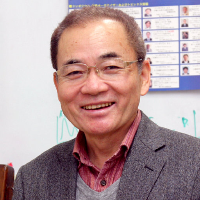2nd World Congress on
Organic Chemistry
August 04-05, 2025 | Online
WCOC 2025

National Institute of Technology, Japan
Abstract:
This study aims to investigate whether the application of ionic liquids on the surface of materials can inhibit biofilms. Many ionic liquids are known to exhibit antimicrobial properties. On the other hand, biofilm properties are still poorly understood. Biofilm is a film-like substance formed by bacteria, water, and EPS, and its formation on material surfaces causes material deterioration and reduced machine performance. This occurs because when bacteria on the material's surface reach a specific concentration, they expel the polysaccharide all at once, which can be seen to correlate to some extent with antimicrobial properties. This led us to believe that the higher the antimicrobial property, the higher the anti-biofilm property. Previously, our laboratory has shown that mixing small amounts of several ionic liquids in aqueous solution in a loop-type biofilm reactor inhibits biofilm formation. In this study, we investigated the ability of quaternary ammonium salts, ionic liquids used as antimicrobial agents, to inhibit biofilm by mixing them into an alkoxysilane-based coating and applying it to the material's surface.
Biography:
Professor Hideyuki Kanematsu has more than 30 years of experience in Scientific Research and Academia, and his research interest is in phisico-chemical phenomena between metallic materials and environmental organism, biofilm, and biofouling. He is currently Deputy President at National Institute of Technology, Suzuka (Japan) and Professor in the Department of Material and Science at Suzuka National College of Technology (Japan). He holds a Ph.D. in Materials Science and Engineering from Nagoya University (Japan). Professor Kanematsu received several honors and awards that include the Scientific Achievement Award from the National Association for Surface Finishing (United States); the Outstanding Achievement Award from the American Chemical Society (United States); the President Award from the Association of National Colleges of Technology (Japan); the ChemLuminary Award from the American Chemical Society (United States).
